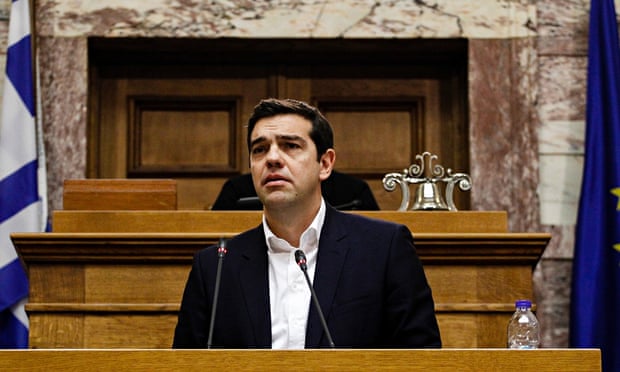Helena Smith in Athens Monday 9 February 2015
Prime minister says government’s first priority is to tackle humanitarian crisis caused by years of austerity
Greece prime minister Alexis Tsipras delivering his first speech at the parliamentary session of Syriza. Photograph: Kostis Ntantamis/Rex

The Greek prime minister, Alexis Tsipras, has announced his anti-austerity government programme in a defiant address that prioritised the jobless and destitute over international creditors who have lent the country more than $300bn (£200bn).
In his first policy speech before parliament, he said his government did not have the right to prolong the five-year bailout deal that has foisted austerity on Greece, and felt a duty “not to disappoint” those who had voted him into power.
“We see hope, dignity and pride returning to Greek citizens. Our obligation and duty is not to disappoint them,” he told the 300-seat house. “We realise that negotiations [with foreign lenders] won’t be easy … but we have faith in our struggle, because justice is on our side.”
Declaring his administration “a government of national salvation”, Tsipras said he would also pursue claims to win back from Germany wartime loans that Greece had been forced to make to Nazi occupiers. “I can’t overlook what is an ethical duty, a duty to history … to lay claim to the wartime debt.”
Tsipras did signal a new round of belt-tightening – but on the part of ministers and MPs. He promised to sell half of all government limousines and a government jet in a money-raising exercise, as well as trimming back on security. Tsipras said Greece’s new class of politician would set the example of frugal living. “We do not need three government aircraft. Politicians can do away with the privilege of having a car,” he said.
But the measures are small by comparison with the enormity of Greece’s debt obligations. Athens must pay $25bn in debt repayments this year. Some observers believe the crunch will force Greece from the Eurozone.
The British chancellor, George Osborne, admitted the UK had already embarked on contingency plans in preparation for a Greek exit from the single currency. “This standoff between Greece and the Eurozone is increasing the risks every day,” he told the BBC’s Andrew Marr show on Sunday, adding that Athens’ departure from the bloc would not only send European financial markets into a tailspin, but cause “real ructions” in the UK.
Advertisement
Earlier, Alan Greenspan, the former head of the US Federal Reserve, said it was only a matter of time before the country left the Eurozone. He said it was difficult to see why anyone would be willing to lend Greece more money and that without additional loans, the country would be forced to default and leave the euro.
“It’s just a matter of time before everyone recognises that parting is the best strategy,” he told BBC Radio 4’s The World This Weekend. “It is not a decision where they are going to come to an agreement. All the cards are being held by the members of the Eurozone.”
Greenspan also conceded that a Greek exit might trigger a meltdown in global financial markets: “I don’t think we have a choice.”
The former US policymaker said the Eurozone would dismantle further unless it became fully integrated at a political level.
“This is a monumental type of construction and the problem that I see at this stage is that there is no way that I can conceive of the euro continuing unless and until all of the members of the Eurozone become politically integrated. Even just fiscally integrated won’t do it. I would say short of a political union, I find it very difficult to foresee the euro holding together in its current form.”
In his speech, Tsipras said he would seek some kind of bridging loan with Greece’s creditors to tide the country over. Last week, he was warned that he faced the stark choice of applying for an extension of the current bailout accord by 16 February or going it alone. On Sunday, he said an extension was out of the question.
“The first priority of this government … is tackling the big wounds of the bailout, tackling the humanitarian crisis, just as we promised to do before the elections,” he said. “The bailout failed. The new government is not justified in asking for an extension … an extension would be a mistake and a catastrophe. We want a new deal, a bridge programme that would give us the fiscal space that a sincere negotiation requires,” he said.
Syriza’s pledges to the electorate include a freeze on pension cuts, a property tax overhaul, free electricity to those who have been cut off, reinstating jobs and raising the minimum wage. But it remains to be seen how quickly the measures are introduced – a phased approach could save the broke government money, officials have indicated.
In a separate gesture, Tsipras also said he would reopen ERT public television, which was closed in 2013 by the previous government to save money. ERT would be reopened to “repair a crime against Greek people and democracy”, he said.
Tsipras’s address came at the start of a big week for Greece’s relations with Europe. On Wednesday, the Euro group of finance ministers will hold an emergency meeting on the Greek crisis. On Thursday, a full summit in Brussels will be attended by both Tsipras and Angela Merkel.
Tsipras favours Greek jobless over creditors in defiant policy speech | World news | The Guardian
![The [Greek] European Tragedy](https://blogger.googleusercontent.com/img/b/R29vZ2xl/AVvXsEiWKI5s90SFm1wWTk6bs4p7CgslaC2SnYPsrZhb-B-smOufNNCSxCvpBLI9hOB-LsXZjir_PNmEiMk2-E62F3xkg96IoC6QFAaZAnPRTVH340IN9WBRmWJqPkjWlgyRj3zpALp7h6hvA58/s920/GkBack_new.jpg)